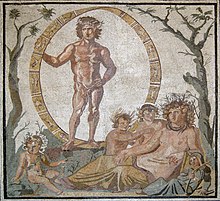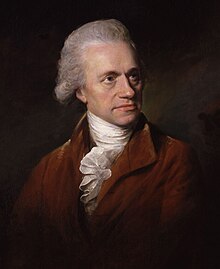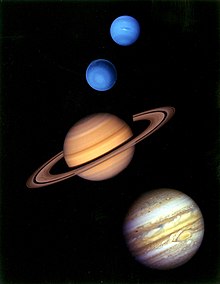Uranus

Uranus is the seventh planet from the Sun. It has the third-largest planetary radius and fourth-largest planetary mass in the Solar System. Uranus is similar in composition to Neptune, and both are of different chemical composition to the larger gas giants Jupiter and Saturn. Thus, astronomers sometimes place them in a separate category called "ice giants". Uranus's atmosphere, although similar to Jupiter's and Saturn's in its primary composition of hydrogen and helium, contains more "ices", such as water, ammonia, and methane, along with traces of hydrocarbons. It is the coldest planetary atmosphere in the Solar System, with a minimum temperature of 49 K (−224.2 °C), and has a complex, layered cloud structure, with water thought to make up the lowest clouds, and methane the uppermost layer of clouds.
Quotes
[edit]- Quotes are arranged alphabetically by author.
A - F
[edit]- giant planet whose equator is nearly at right angles to its orbit. A collision with an Earth-sized object may explain the unique tilt. Nearly a twin in size to Neptune, Uranus has more methane in its mainly hydrogen and helium atmosphere than Jupiter or Saturn. Methane gives Uranus its blue tint.
- National Aeronautics and Space Administration (NASA)in: Uranus: Overview, National Aeronautics and Space Administration (NASA).
- About Uranus: If the Sun were as tall as a typical front door, Earth would be the size of a nickel and Uranus would be about as big as a baseball; Uranus orbits our Sun, a star. Uranus is the seventh planet from the Sun at a distance of about 2.9 billion km (1.8 billion miles) or 19.19 AU.; One day on Uranus takes about 17 hours (the time it takes for Uranus to rotate or spin once). Uranus makes a complete orbit around the Sun (a year in Uranian time) in about 84 Earth years; Uranus is an ice giant; Most (80 percent or more) of the planet's mass is made up of a hot dense fluid of "icy" materials – water (H2O), methane (CH4). and ammonia (NH3) – above a small rocky core; Uranus has an atmosphere which is mostly made up of hydrogen (H2) and helium (He), with a small amount of methane (CH4); Uranus has 27 moons; Uranus' moons are named after characters from the works of William Shakespeare and Alexander Pope; Uranus has faint rings; The inner rings are narrow and dark and the outer rings are brightly colored; Voyager 2 is the only spacecraft to have visited Uranus; Uranus cannot support life as we know; Like Venus, Uranus has a retrograde rotation (east to west). Unlike any of the other planets, Uranus rotates on its side, which means it spins horizontally.
- National Aeronautics and Space Administration (NASA)in: "Uranus: Overview".
- Formed a design at the beginning of this week of investigating, as soon as possible after taking my degree, the irregularities in the motion of Uranus which are yet unaccounted for; in order to find whether they may be attributed to the action of an undiscovered planet beyond it ; and if possible, thence to determine the elements of its orbit, etc., approximately which would probably lead to its discovery [Neptune].
- John Couch Adams in: Journal - Society of Engineers, Society of Engineers (London, England), 1893, p. 252.
- The moons of Uranus seem to have got a twist.
- Sir Robert Stawell Ball in: Star-land: Being Talks with Young People about the Wonders of the Heavens, Ginn, 1892, p. 227



- The Solar System consists of eight "planets" Mercury, Venus, Earth, Mars, Jupiter, Saturn, Uranus and Neptune. A new distinct class of objects called "dwarf planets" exist. "Planets" and "dwarf planets" are two distinct classes of objects. The first members of the "dwarf planet" category are Ceres, Pluto and 2003 UB313 (temporary name).
- Definition by International Astronomical Union (IAU) in: iau0603 — News Release, International Astronomical Union, 2006.
- The word planet comes from the Greek for “wanderer,” because the planets' positions change relative to those of the stars. The eight (formerly nine) recognized planets that orbit the Sun are, in order of increasing distance, Mercury, Venus, Earth, Mars, Jupiter, Saturn, Uranus, and Neptune. The first four are called terrestrial planets and the next four giant, or Jovian, planets.
- Merriam Webster Dictionary in: planet, merriam-webster.com.
- Uranus, one of the giant planets, is the seventh planet from the Sun, sometimes visible to the naked eye. It has 27 satellites, ring system, and an axis of rotation almost lying in the plane of the orbit. Mean distance from Sun: 2870 million km; period of revolution around sun: 84 years; period of axial rotation: 17.23 hours; diameter and mass: 4 and 14.5times that of earth respectively.
- Dictionary.com in: Uranus, Dictionary.com.
- Uranus is also, Ouranos in Classical Mythology, the personification of Heaven and ruler of the world, son and husband of Gaea (Earth) and father of the Titans, who was castrated and dethroned by his youngest son, Cronus,at the instigation of Gaea.
- Dictionary.com in: “Uranus”
- ... named for the Greek god of the sky. Uranus was the first planet discovered in modern times (1781).
- The American Heritage New Dictionary of Cultural Literacy quoted in Dictionary.com in: “Uranus”
- First planet discovered that was not known in ancient times, named for the god of Heaven, husband of Gaia, the Earth, from Latin Uranus, from Greek Ouranos literally "heaven," in Greek cosmology, the god who personifies the heavens, father of the Titans. Cf. Urania, name of the Muse of astronomy, from Greek Ourania, fem. of Ouranios, literally "heavenly."
- The American Heritage New Dictionary of Cultural Literacy quoted in: Dictionary.com in: “Uranus”
- The planet [Uranus] was discovered and identified as such in 1781 by Sir William Herschel (it had been observed before, but mistaken for a star, e.g. in 1690 when John Flamsteed cataloged it as 34 Tauri); Herschel proposed calling it Georgium Sidus, literally "George's Star," in honour of his patron, King George III of England.
- In Online Etymology Dictionary (2010) by Douglas Harper quoted in: Dictionary.com in: “Uranus”
- In our solar system, planetary rings are found around all the giant planets, showing spectacular variety. Jupiter's thin ring system is composed mostly of dust... Uranus has ten narrow, sometimes eccentric rings and a family of dust bands... All the ring systems have moons interspersed, which sculpt, collect, and release ring material. Moons are the likely parents of the present rings, ground down by meteorites and destroyed randomly to produce the relatively short-lived ring systems. Thus, we observe the natural stochastic results of birth and death processes when we examine the rings closely. Ring systems are relatively nearby and provide a natural laboratory for phenomena in flattened disks, including the nebula around our Sun that gave rise to the planets.
- Larry W. Esposito in: Planetary rings, SAO/NASA ADS Astronomy Abstract Service.
- The planet was known in English in 1780s as the Georgian Planet ; French astronomers began calling Herschel, and ultimately German astronomer Johann Bode proposed Uranus as in conformity with other planet names. However, the name didn't come into common usage until c.185
- In Online Etymology Dictionary (2010) by Douglas Harper quoted in: Dictionary.com in: “Uranus”
- Although Uranus and Neptune are superficially twin planets, they are different enough to remind us - as do Venus and Earth - that we still have a lot to learn about the mix of natural laws and historical accidents that formed the planets and fashioned their destinies.
- Timothy Ferris in: Seeing in the Dark: How Amateur Astronomers Are Discovering the Wonders of the Universe,Simon and Schuster, 8 July 2003, p. 206.
G - L
[edit]
- I cannot but wish to take this opportunity of expressing my sense of gratitude, by giving the name of Georgium Sidus... to a star which (with respect to us) first began to shine under His auspicious reign.
- Sir William Herschel (1783) quoted in Online Etymology Dictionary (2010) by Douglas Harper quoted in Dictionary.com in: “Uranus”
- Then felt I like some watcher of the skies
When a new planet swims into his ken.- John Keats in On First Looking Into Chapman's Homer, City University of New York, 2009
- "On First Looking Into Chapman's Homer" is a reference to Herschel's discovery of Uranus.
- ...Pechblende does not belong either to the ores of zinc, or to those of iron, nor yet to the genus of tungsten or wolfram, and in general to none of the metallic substances hitherto known; but, on the contrary, that it consists of a peculiar, distinct, metallic substance. Therefore its former denominations, Pechblende, pitch-iron-ore, &c. are no longer applicable, and must be supplied by another more appropriate name. --- I have chosen that of Uranium, as a kind of memorial, that the chemical discovery of this new metal happened in the period of astronomical discovery of the new planet Uranus.
- Martin Heinrich Klaproth in Analytical Essays towards Promoting the Chemical Knowledge of Mineral Substances quoted in : A New Name for Pechblende, Massachusetts Institute of Technology
- Uranus after Voyager 2's encounter with Uranus was a complete success. Astronomers now have the task of interpreting all the data they gathered.
ONLY a few months ago, it was possible to put the sum total of our knowledge of the distant planet Uranus into a single article. But in just a few hours, the hardy space probe Voyager 2 changed all that...Before the encounter on 24 January, astronomers knew that Uranus was four times the size of the earth, tipped up so that it ‘rotates on its side” as it orbits the sun every 84 years. It had five moons, each a few hundred kilometers across and a set of nine very narrow rings.- Nigel Henbest in: New Scientist Vol. 111, No. 1519, 31 July 1986 Reed Business Information.
- Synchronicity does not admit causality in the analogy between terrestrial events and astrological constellations... What astrology can establish are the analogous events, but not that either series is the cause or the effect of the other. (For instance, the same constellation may at one time signify a catastrophe and at another time, in the same case, a cold in the head.) … In any case, astrology occupies a unique and special position among the intuitive methods... I have observed many cases where a well-defined psychological phase, or an analogous event, was accompanied by a transit (particularly when Saturn and Uranus were affected).
- Carl G. Jung in: The Seventh House, Xlibris Corporation, 21 August 2012, p. 63.
- Scientific development depends in part on a process of non-incremental or revolutionary change. Some revolutions are large, like those associated with the names of Copernicus, Newton, or Darwin, but most are much smaller, like the discovery of oxygen or the planet Uranus. The usual prelude to changes of this sort is, I believed, the awareness of anomaly, of an occurrence or set of occurrences that does not fit existing ways of ordering phenomena. The changes that result therefore require 'putting on a different kind of thinking-cap', one that renders the anomalous lawlike but that, in the process, also transforms the order exhibited by some other phenomena, previously unproblematic.
- Thomas S. Kuhn in: Domenico Delli Gatti et al., Macroeconomics from the Bottom-up, Springer Science & Business Media, Apr 18, 2011, p. 101.
M - R
[edit]- Wide are the meadows of night
And daisies are shining there,
Tossing their lovely dews,
Lustrous and fair;
And through these sweet fields go,
Wanderers amid the stars—
Venus, Mercury, Uranus, Neptune,
Saturn, Jupiter, Mars.- Walter De La Mare in:"The Wanderers" quoted in: Kate Louise Roberts Hoyt's New Cyclopedia Of Practical Quotations, p. 750

- The more important fundamental laws and facts of physical science have all been discovered, and these are now so firmly established that the possibility of their ever being supplanted in consequence of new discoveries is exceedingly remote. Nevertheless, it has been found that there are apparent exceptions to most of these laws, and this is particularly true when the observations are pushed to a limit, i.e., whenever the circumstances of experiment are such that extreme cases can be examined. Such examination almost surely leads, not to the overthrow of the law, but to the discovery of other facts and laws whose action produces the apparent exceptions. As instances of such discoveries, which are in most cases due to the increasing order of accuracy made possible by improvements in measuring instruments, may be mentioned: first, the departure of actual gases from the simple laws of the so-called perfect gas, one of the practical results being the liquefaction of air and all known gases; second, the discovery of the velocity of light by astronomical means, depending on the accuracy of telescopes and of astronomical clocks; third, the determination of distances of stars and the orbits of double stars, which depend on measurements of the order of accuracy of one-tenth of a second-an angle which may be represented as that which a pin's head subtends at a distance of a mile. But perhaps the most striking of such instances are the discovery of a new planet or observations of the small irregularities noticed by Leverrier in the motions of the planet Uranus, and the more recent brilliant discovery by Lord Rayleigh of a new element in the atmosphere through the minute but unexplained anomalies found in weighing a given volume of nitrogen. Many other instances might be cited, but these will suffice to justify the statement that “our future discoveries must be looked for in the sixth place of decimals.”
- A.A. Michelson 1903 quoted in: Chapter 28 An Introduction to Quantum Physics, Physics Department @ Brock University, 14 January 2011, p. 8-9.
S - Z
[edit]- A slight sound at evening lifts me up by the ears, and makes life seem inexpressibly serene and grand. It may be in Uranus, or it may be in the shutter.
- Henry David Thoreau in his journal for July 10-14, 1841 quoted in: Robert Finch, John Elder The Norton Book of Nature Writing, W. W. Norton & Company, 1990, p. 475.
Astrology: Understanding the Birth Chart
[edit]

Kevin Burk in: Astrology: Understanding the Birth Chart, Llewellyn Worldwide, 2001
- During this time period, the discovery of the planet Uranus in 1781 caused a tremendous upset in the astrological community: this new planet forced the reevaluation of the entire system of Western astrology. Although Neptune’s and Pluto’s subsequent discoveries certainly caused stirs, Uranus was the planet that shook things up.
- In: p. 4.
- The most common distinction made between the planets is “inner planets” versus outer “planets”. The term inner planets usually refers to the seven visual planets (although sometimes Jupiter and Saturn are not included in this list). This type of classification is very much a modern construct: before 1781, when Herschel discovered Uranus, there were only "inner" or "visible" planets—planets that were visible to the naked eye. (Of course the skies were a great deal clearer then). These included the Sun, Moon, Mercury, Venus, Mars, Jupiter, and Saturn. The outer planets are the planets that are only visible with a telescope: Uranus, Neptune and Pluto. The asteroid Chiron functions as a bridge between the inner and the outer planets....The fastest of the outer planets is Uranus which takes about 84 years to complete a cycle of the Zodiac. Today it is not unusual to see people to live past their Uranus return and humans are gradually developing a greater understanding of the energy of Uranus.
- In: p. 14.
- Although modern astrologers consider the planet Uranus to be the ruler of Aquarius, and support this because of Aquarius' tendency to be revolutionary and unconventional, Aquarius is traditionally ruled by the planet Saturn.
- In: p. 75.
- True to its nature, when Uranus was discovered in 1781, the very neat and symmetrical system of essential dignities was challenged and upset for the first time in history.
- In: p. 88.
- The outer planets, which include Chiron, Uranus, Neptune, and Pluto, don't operate on an individual level the way the inner planets do, and they don't fit into the system of essential dignities. Uranus, Neptune, and Pluto spend so much time in each sign that they define the characteristics of entire generations, not of individuals.
- In: p. 146.

